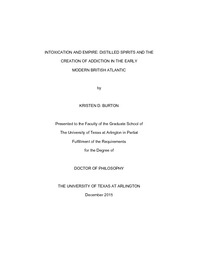
ATTENTION: The works hosted here are being migrated to a new repository that will consolidate resources, improve discoverability, and better show UTA's research impact on the global community. We will update authors as the migration progresses. Please see MavMatrix for more information.
Show simple item record
| dc.contributor.advisor | Morris, Christopher | |
| dc.creator | Burton, Kristen D. | |
| dc.date.accessioned | 2016-01-26T22:32:34Z | |
| dc.date.available | 2016-01-26T22:32:34Z | |
| dc.date.created | 2015-12 | |
| dc.date.issued | 2015-11-30 | |
| dc.date.submitted | December 2015 | |
| dc.identifier.uri | http://hdl.handle.net/10106/25428 | |
| dc.description.abstract | This dissertation exams how the spread of imperialism in the British Atlantic led to the mass production and consumption of distilled spirits during the seventeenth and eighteenth centuries. Through transatlantic colonization, distilled liquors, once produced as medicinal remedies, developed into a thriving industry by the beginning of the eighteenth century. This change in the purpose and use of distilled spirits prompted political, religious, and medical leaders to ask new questions about the effects and possible threats of consuming such spirits. This dissertation is a study of perceptions; it examines how spirits became the means through which people evaluated the place and proper behavior of women, the working poor, indigenous peoples, enslaved laborers, and backcountry famers, among others.
While alcohol was thought by many to be spiritually and physically nourishing, mass production and distribution of rum in the mid-seventeenth century created new questions and concerns among elites about intoxication, bodily health, and the perceived threat of lost control over the laboring poor in England, and over indigenous communities and enslaved peoples throughout the empire. Social elites constructed narratives around new notions of inebriation based upon the loss of physical, as well as moral, control. Through these narratives, physicians came to create new theories of habitual drinking as a compulsive act. Altered perceptions, constructed from unprecedented eighteenth-century drinking practices, redefined alcohol as an intoxicant. This established the framework of what became early addiction theory, which emerged during the initial decades of the modern era. Eighteenth-century imperial, medical, and religious debates over distilled spirits, in turn, established the foundation for early ideas of alcoholism and transatlantic movements advocating temperance. | |
| dc.format.mimetype | application/pdf | |
| dc.language.iso | en_US | |
| dc.subject | Alcohol | |
| dc.subject | Distilled spirits | |
| dc.subject | Distillation | |
| dc.subject | Drunkenness | |
| dc.subject | Intoxication | |
| dc.subject | Early modern history | |
| dc.subject | British imperialism | |
| dc.subject | British Atlantic | |
| dc.subject | Slavery | |
| dc.subject | Indigenous peoples | |
| dc.subject | Caribbean history | |
| dc.subject | Slave resistance | |
| dc.subject | Backcountry settlers | |
| dc.subject | Scotch-Irish history | |
| dc.subject | Native American stereotypes | |
| dc.subject | Addiction theory | |
| dc.subject | Temperance history | |
| dc.title | Intoxication and Empire: Distilled Spirits and the Creation of Addiction in the Early Modern British Atlantic | |
| dc.type | Thesis | |
| dc.date.updated | 2016-01-26T22:32:34Z | |
| thesis.degree.department | History | |
| thesis.degree.grantor | The University of Texas at Arlington | |
| thesis.degree.level | Doctoral | |
| thesis.degree.name | Doctor of Philosophy in Transatlantic History | |
| dc.type.material | text | |
| dc.creator.orcid | 0000-0002-2894-9707 | |
Files in this item
- Name:
- BURTON-DISSERTATION-2015.pdf
- Size:
- 4.500Mb
- Format:
- PDF
This item appears in the following Collection(s)
Show simple item record


